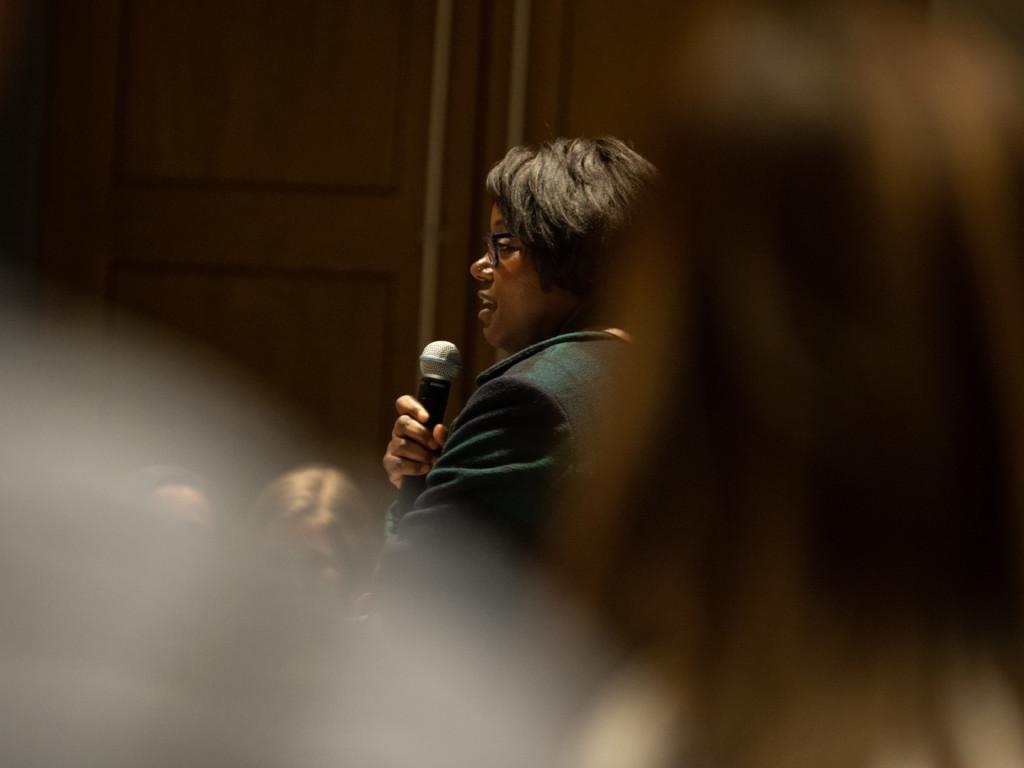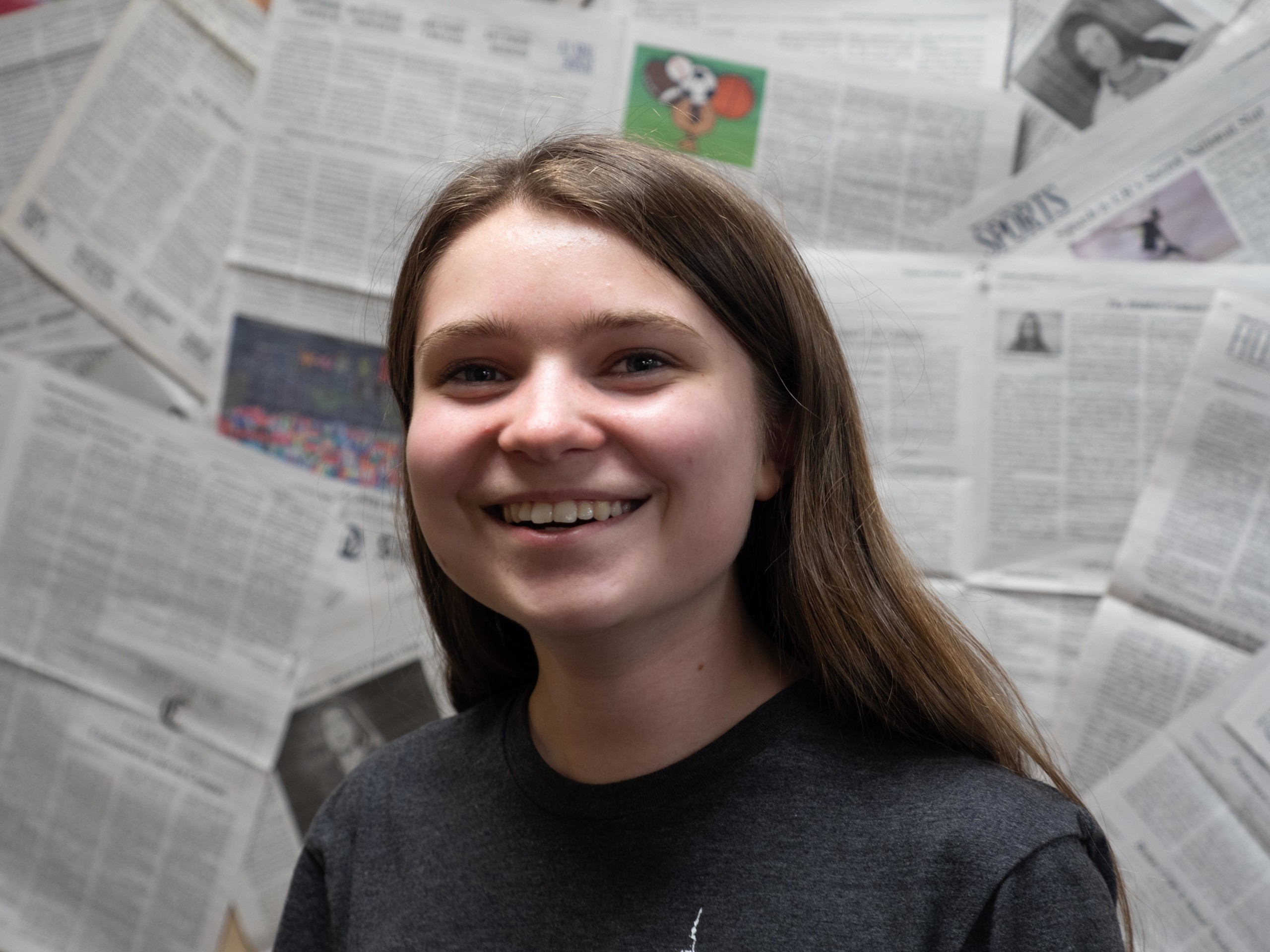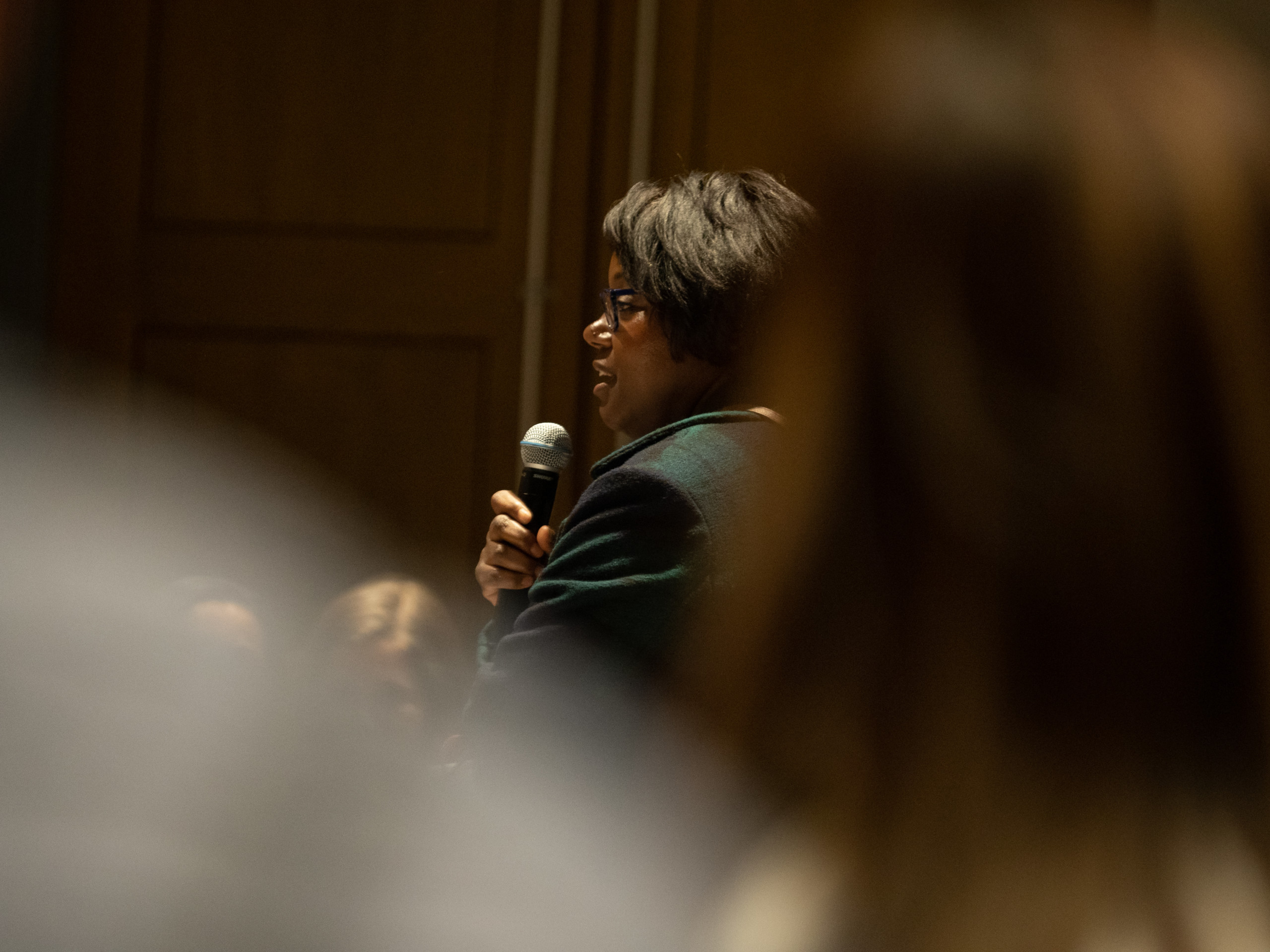Students discussed how to take action on Monday at a One Community Dialogue event hosted by the Burgett Intercultural Center, five days after a photo of a sophomore mirroring the pose of a painting of a black man with his hands up sparked campus outrage.
In the painting, the man was surrounded by text, including an excerpt from the 2018 proposal to arm some public safety officers. The painter removed most of the text from the painting the morning before the Intercultural Center’s event, leaving the words “How are you complicit?”
The large group split into 11 smaller groups, each with their own facilitator, to create posters filled with suggestions for UR administration going forward.
Group Three’s poster read, “Actual action from administration.”
Group Three said that there should be racial sensitivity training ingrained in the UR curriculum. “It can’t just be an optional program,” said a staff member, later adding, “This should be in biology. This should be in your CAS 101, your writing class.” She also argued that faculty should receive the same training. Another student said that racial sensitivity training would help international students acclimate to racial tensions in the US.
The staff member said she felt consequences were also necessary to motivate students to change. She brought up the University’s admonishments against academic dishonesty, which she and others said were disproportionately strict compared to their handling of bias-related incidents.
One student said that while she was disappointed somebody would post a photo like this, “I wasn’t surprised.” Another attendee said that while she was surprised at first, she was becoming more accustomed to racism at UR: “I think this is the second or third incident to happen so far in my first year.”
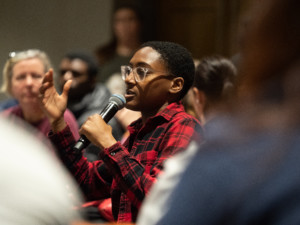
A student speaks at the event in Feldman Ballroom. The event broke attendees into 11 different groups for discussion, and then reconvened later. Photo by Henry Litsky.
A student from Group One said he was concerned there would be no change after the conversations died down. “If this gets brushed under the rug,” he said, “essentially, I’m going to lose a lot of faith in the people we have governing us.”
Another Group One student was concerned by the claim of the person in the photo — sophomore Selina Bilsel — that she was unaware of the painting’s meaning, saying, “The fact that a student who’s been on campus for some time now didn’t know [about the DPS proposal] is a problem.” The facilitator for Group 11 said that despite her actions, he could try to be understanding of Bilsel, as he said she had experienced “pretty much a firewall on social media, in one day.”
Group 11 discussed the possibility of Bilsel transferring out of UR because of the reaction to the photo. “I don’t think it’s really productive if she transfers and never learns,” one student said.
Another student said that white students are frequently unwilling to accept criticism, saying, “It feels like white people rarely see comments from people of color as not attacks.”
When the groups reconvened, they found that they’d discussed many of the same themes. They wanted the University to take action. They wanted cultural sensitivity training to be better incorporated into the curriculum. They wanted the University to be more transparent and communicate more with the students and faculty at large about these sorts of occurrences and the ways they plan to respond.
Group Four had asked why University President Sarah Mangelsdorf was not present for the dialogue. Group Eight wanted a required class incorporating the history of racism in Rochester and at UR in its curriculum. They also wanted Douglass Leadership House to become a permanently funded fixture of UR.
Group Nine wanted a detailed explanation of policies and consequences pertaining to racial bias in the University’s Code of Conduct, as well as more faculty of color in departments other than African-American Studies. Group 11 wanted the Frederick Douglass Institute to be made a full department.
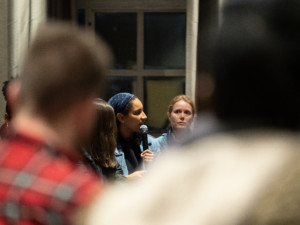
The event was held on Monday, March 2., from 5 p.m. to 7 p.m., five days after the picture was spread around social media. Photo by Henry Litsky
The dialogue closed with the attendees in one large group. Intercultural Center Director Jessica Guzmán-Rea assured students that they “are not alone.”
“Racism happens every day and it impacts people of color every day,” she said. She later added, “What we do as a community to heal has to come from this conversation.”
“Jessica, I hope you’re being supported as well,” one student said, adding “It’s not fair that it’s one person who has to deal with all these different things.”
Senior Lara Andree, the painting’s creator, spoke about the painting towards the event’s close. “I painted my partner in this piece,” she said, “and so I haven’t even really begun to unpack the idea that my partner’s livelihood was mocked.”
“Part of this stemmed from ignorance, but also it happened because of a lack of compassion. And I think that the best way that we all move forward, or one thing that could give a little bit of healing to us, I know it’s not going to be enough for quite a few of us, is to react with compassion.” she later added.
Andree said that while she wanted Bilsel and sophomore Serena Uong — the student who took the photo — to have the opportunity to learn, she wanted to see consequences for them as well.
“I’m hopeful that we can create a culture of change,” she finished, “but also of compassion and forgiveness for one another.”
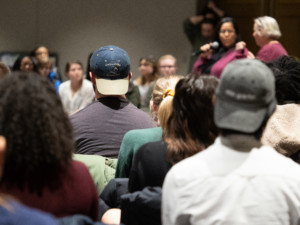
Students at in Feldman Ballroom at the One Community Dialogue event on Monday. Photo by Henry Litsky.
Sequoia Kemp, who graduated UR in 2016 and now attends the School of Nursing, read a quote from Audre Lorde, which she dedicated “to the students of color, who were intimately affected by this.”
“The university was not created to save my life,” Kemp read. “The university is not about the preservation of a bright, brown body. The university will use me alive and use me dead. The university does not intend to love me. The university does not know how to love me. The university, in fact, does not love me, but the universe does.”
“Although we may feel like the university does not love us,” said Kemp, “and they’re making strides, the [universe] does, and so do I.”
